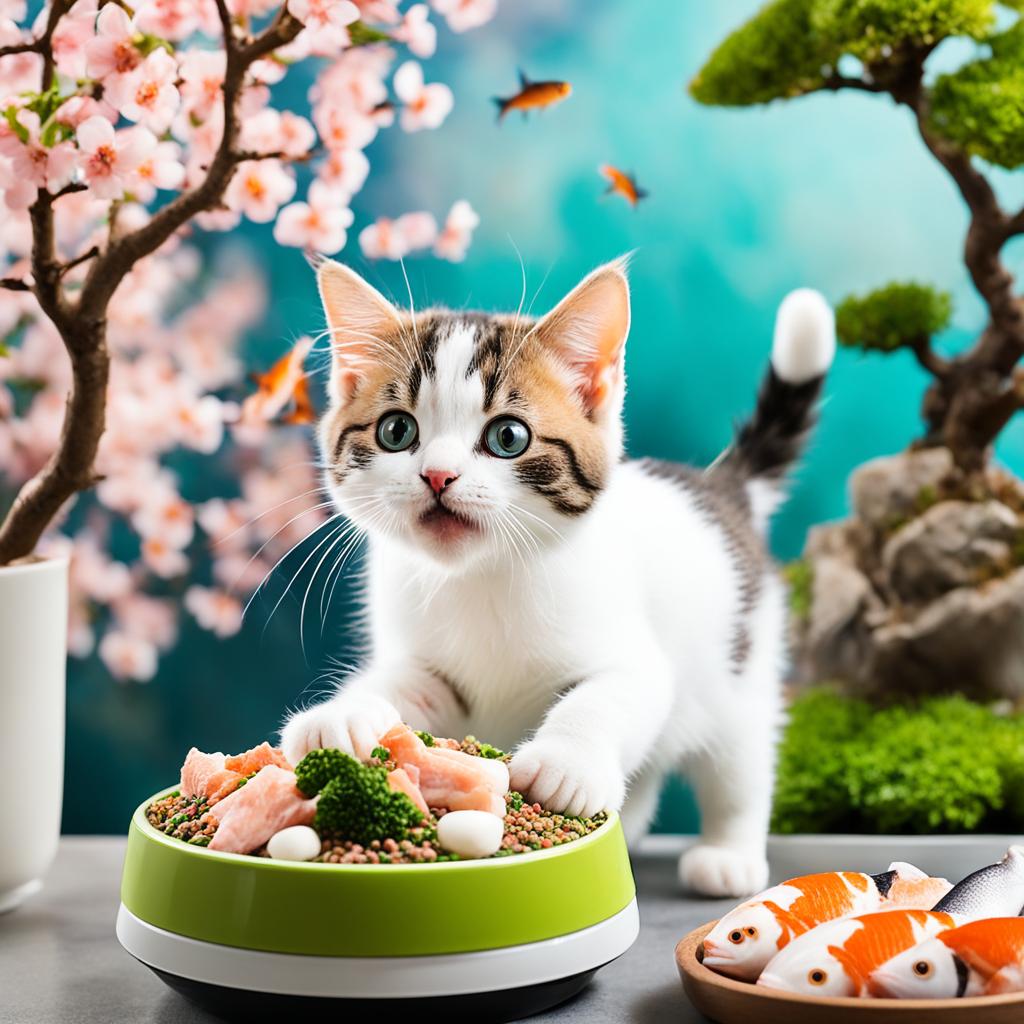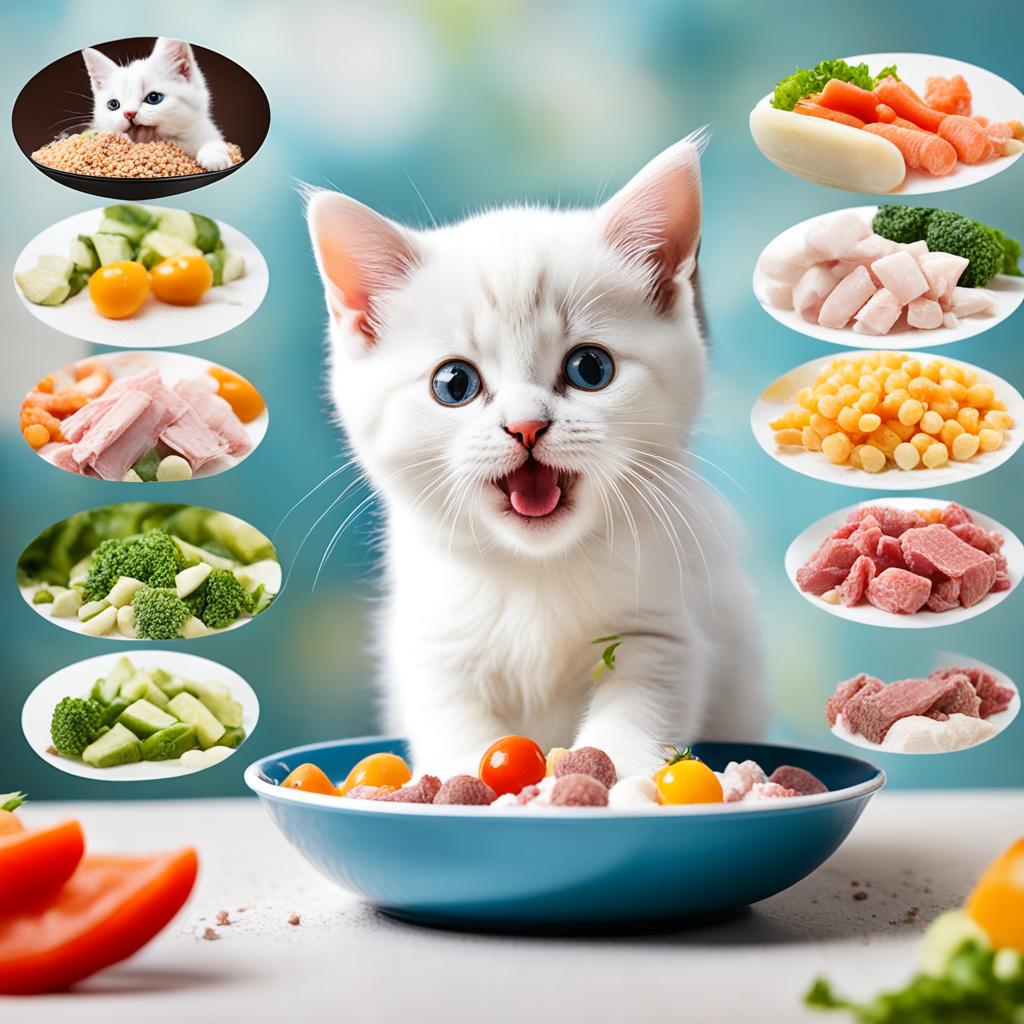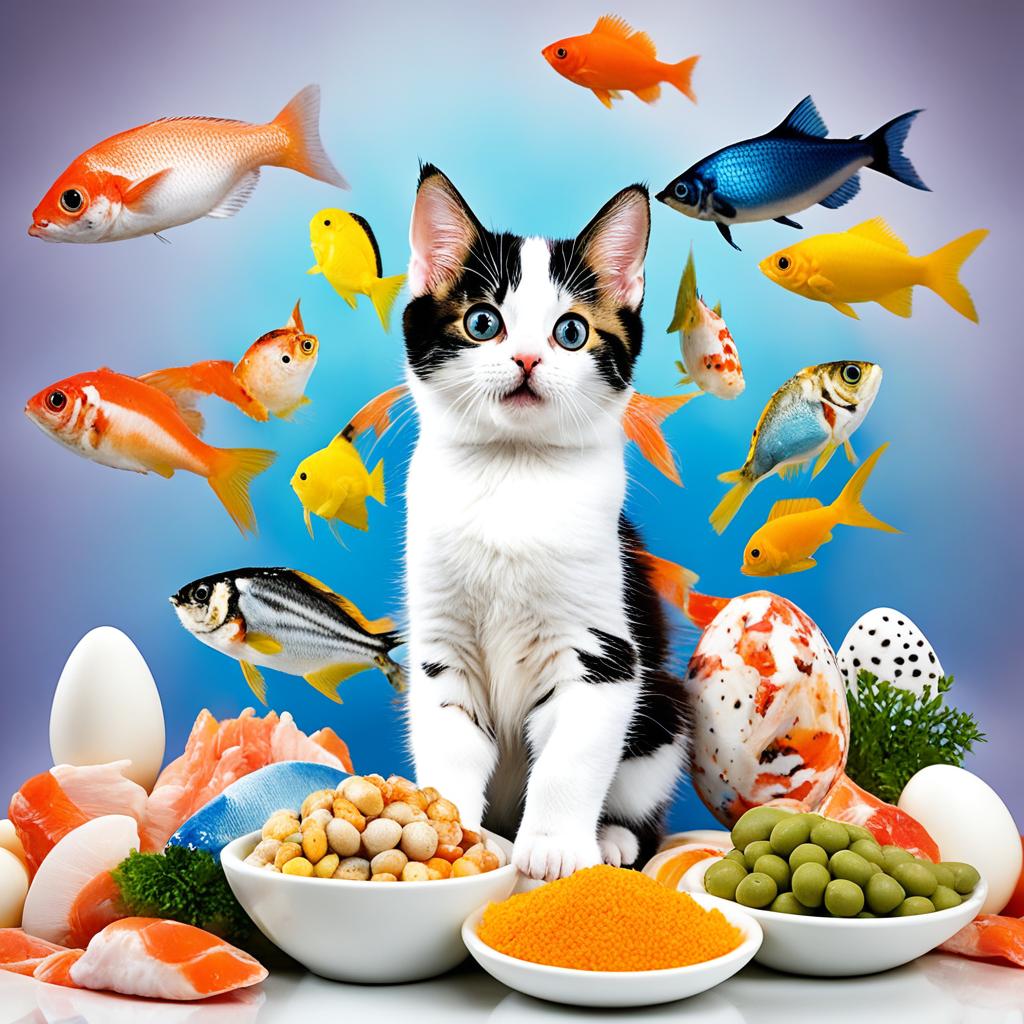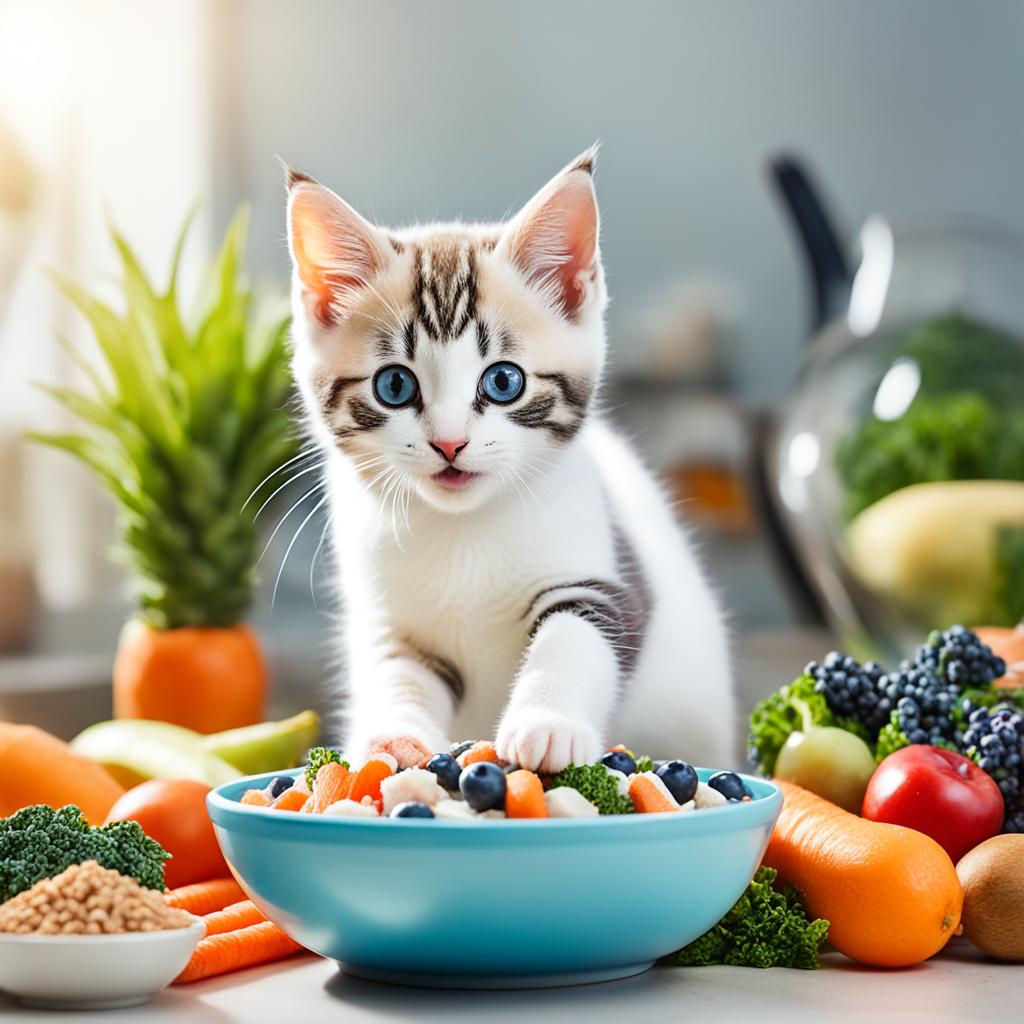Did you know that the first ingredient in your Japanese Bobtail kitten’s food can make all the difference in their health and happiness? Discover the ultimate guide to ensuring your furry friend gets a diet rich in essential nutrients tailored to their obligate carnivorous needs. With meat, meat byproducts, or seafood as the primary ingredients, your kitten will thrive. Learn the importance of a dedicated feeding area and daily play to support their growth and overall well-being. Dive into the expert tips to keep your kitten purring with joy!
Key Takeaways
- Select high-quality brands with meat, meat byproducts, or seafood as the first ingredients.
- Maintain a separate feeding area distinct from the litter box.
- Incorporate daily play and exercise for optimal health.
- Consult veterinarians for comprehensive dietary guidance.
- Understand the crucial role of a balanced diet rich in essential nutrients.
Understanding a Japanese Bobtail Kitten’s Dietary Needs

Recognizing the dietary requirements of Japanese Bobtail kittens is crucial in ensuring their long lifespan of 10 to 15 years. These kittens might have a diverse genetic makeup, but safeguarding their health means providing a balanced Japanese Bobtail Kitten diet tailored to their specific needs.
As obligate carnivores, Japanese Bobtail kittens thrive on a diet primarily composed of animal protein. This nature dictates that a significant portion of their diet should consist of high-quality meat. For a thriving and energetic kitten, incorporating a blend of fats, minerals, vitamins, and minimal carbohydrates is key. This intricate balance ensures they maintain optimal vigor and health.
Adhering to FEDIAF guidelines is essential, as it guarantees that your kitten’s food meets all necessary nutrient requirements. The best foods for Japanese Bobtail Kittens will not only be rich in protein but will also be labeled as “complete,” covering all vital nutrients for their well-being.
When selecting from the variety of foods available, focusing on high-quality brands known for their rigorous standards in Japanese Bobtail Kitten nutrition is a safe bet. This diligence ensures that your feline friend thrives, leading a long, healthy, and happy life. After all, a well-fed kitten is a joyous companion!
Animal Proteins: Essential For Growth

Animal proteins are vital to the growth and development of your Japanese Bobtail kitten. The foundation of their diet should be rich in high-quality meat and seafood, ensuring they receive optimal nourishment.
Types of Meat and Seafood
Diversifying the types of protein in your kitten’s diet is key. Poultry, beef, and fish are excellent choices, each providing a unique profile of amino acids essential for health.
A thorough review of food options will help you understand what are the best foods for Japanese Bobtail kittens, ensuring you select meats and seafood that contribute to a balanced diet.
Protein Quality and Sources
When examining a Japanese Bobtail’s diet, the quality of the protein sources cannot be overstated. Opt for brands that prioritize whole meats over fillers. Reading food labels carefully will help you ensure that your kitten is receiving nutrient-dense proteins, not additives or low-quality by-products.
| Type of Protein | Benefits | Brands |
|---|---|---|
| Poultry | Rich in amino acids, easily digestible | Wellness, Blue Buffalo |
| Beef | High in iron and zinc | Instinct, Orijen |
| Fish | Omega-3 fatty acids for skin and coat | Acana, Tiki Cat |
By following this Japanese Bobtail kitten food guide, you can ensure your furry friend receives the best possible nutrition for their development.
Why Essential Fats Matter in Kitten’s Diet

Ensuring that your Japanese Bobtail kitten receives essential fats in their diet is crucial for their overall health and development. These fats are integral components of nutritious foods for Japanese Bobtail kittens and contribute significantly to their growth.
Benefits of Omega-3 and Omega-6 Fatty Acids
Omega-3 and Omega-6 fatty acids offer a slew of benefits for your kitten. Notably, they enhance cognitive development, support vision, and provide anti-inflammatory benefits that are vital for a healthy diet for Japanese Bobtail kittens. Additionally, these fatty acids contribute to a lustrous coat and healthy skin, ensuring your furry friend looks as good as they feel.
Sources of Healthy Fats
Healthy fats can be sourced from a variety of foods. Fish, flaxseed, and certain plant oils are excellent choices to include in your kitten’s diet. These sources not only provide the necessary fatty acids but also play an essential role in crafting nutritious foods for Japanese Bobtail kittens. Integrating these fats appropriately is essential for the holistic development and maintenance of your kitten’s health.
Choosing the Right Carbohydrates

Selecting appropriate carbohydrates is an important factor in feeding Japanese Bobtail kittens. While they don’t require substantial carbohydrates, the quality of what they do consume is vital. Deciding between grain-free and grain-inclusive diets can be tricky, but understanding the nuances will guide you to the best choice for your kitten’s nutrition.
Grain-Free vs. Grain-Inclusive Diets
The debate between grain-free and grain-inclusive diets boils down to your kitten’s specific needs. Grain-free diets are often recommended for kittens with grain allergies or sensitivities, ensuring they receive nutrition without adverse reactions. However, some believe grain-inclusive diets can also provide balanced Japanese Bobtail kitten nutrition if chosen wisely. Both options have their merits, but the best foods for Japanese Bobtail kittens should avoid unnecessary fillers and focus on overall quality.
Good Carbohydrate Sources
When identifying good carbohydrate sources, think vegetables and legumes. These not only provide essential fiber but also add valuable nutrients to your kitten’s diet. Choose ingredients such as sweet potatoes, peas, and lentils, as they rank high in nutritional value. By focusing on these, you ensure that feeding Japanese Bobtail kittens is a task carried out with optimal care and precision, promoting their health and well-being.
| Carbohydrate Source | Benefits |
|---|---|
| Sweet Potatoes | Rich in fiber and vitamins |
| Peas | High in protein and contain essential amino acids |
| Lentils | Great source of plant-based protein and fiber |
Vitamins and Minerals for Optimal Health

To ensure your Japanese Bobtail kitten grows into a strong and healthy cat, it’s imperative to provide a well-rounded diet full of essential vitamins and minerals. Neglecting these nutrients can lead to deficiencies and long-term health issues. Let’s delve into the vital components that should be part of your kitten’s balanced diet.
Essential Vitamins
Vitamins are crucial for the holistic growth of Japanese Bobtail kittens. Here’s a breakdown of the vitamins your kitten needs:
| Vitamin | Function | Sources |
|---|---|---|
| Vitamin A | Immune function and vision | Animal liver, fish oils |
| Vitamin D | Bone development and calcium absorption | Egg yolks, fish |
| Vitamin E | Antioxidant, skin, and coat health | Plant oils, leafy greens |
| B-complex Vitamins | Energy production and metabolism | Whole grains, meat |
| Vitamin K | Blood clotting | Green leafy vegetables, liver |
Key Minerals and Their Benefits
Incorporating essential minerals is another critical aspect of the Japanese Bobtail kitten food guide. These minerals support various bodily functions and promote overall well-being:
- Calcium and Phosphorus: Fundamental for strong bone and teeth structure. Found in meat, fish, and bone meal.
- Iron: Crucial for blood health and carrying oxygen throughout the body. Located in meats, especially red meat.
- Potassium: Necessitates muscle function and nerve signals. Abundant in fish, poultry, and meats.
- Magnesium: Supports muscle and nerve functions. Sources include fish, meat, and leafy greens.
By ensuring that your pet’s diet includes these vital nutrients, you’ll be aiding their development and keeping them spry and healthy. Keep this guide handy while selecting nutritious foods for Japanese Bobtail kittens to aid their splendid growth.
Wet Food or Dry Food: Which is Better?

When it comes to choosing between wet food and dry food for your Japanese Bobtail kittens, both options present unique benefits tailored to their specific needs. Understanding these can help you make an informed decision, ensuring a healthy diet for Japanese Bobtail kittens.
Wet food often boasts higher moisture content, which is particularly beneficial for keeping your kitten well-hydrated. This is crucial, as proper hydration supports kidney function and overall health. Wet food typically features a stronger aroma and texture, making it an irresistible choice for picky eaters.
On the other hand, dry food offers a distinct advantage in promoting dental health. The abrasive texture of kibble can help reduce tartar buildup, making mealtime a sneaky dental hygiene routine. Additionally, dry food is more convenient to store and can be left out for free feeding without the risk of spoiling.
A balanced approach combining both wet and dry food might be the perfect solution. This method not only caters to your kitten’s hydration and dental needs but also keeps their meals varied and exciting. After all, a happy, healthy diet for Japanese Bobtail kittens is all about mixing it up while meeting their nutritional requirements.
| Factor | Wet Food | Dry Food |
|---|---|---|
| Hydration | High moisture content | Low moisture content |
| Dental Health | Less abrasive | Helps reduce tartar buildup |
| Convenience | Requires refrigeration | Easy to store and serve |
| Palatability | Stronger aroma and texture | Varied flavors, less smell |
When feeding Japanese Bobtail kittens, monitor their reactions to both types of food. Some kittens may show a clear preference, while others enjoy a mix of both. Finding the right balance ensures a healthy diet for Japanese Bobtail kittens, setting the stage for their growth and vitality.
Feeding Schedule and Portion Control

Creating a precise feeding schedule and appropriate portion control is key to maintaining a healthy Japanese Bobtail Kitten diet. By ensuring a consistent routine, you can help regulate their metabolic rate and prevent overfeeding, which leads to obesity-related issues.
Recommended Feeding Frequency
For a healthy diet for Japanese Bobtail Kittens, the general recommendation is to feed multiple small meals throughout the day. Kittens, with their high energy levels and fast metabolism, typically do well with three to four small meals daily. As they grow older, you can gradually transition to fewer meals.
Portion Sizes Based on Age and Weight
Portion sizes should be carefully calculated based on the kitten’s age, weight, and energy requirements. Younger kittens may have different caloric needs compared to older ones. It’s essential to strike the right balance to ensure that your kitten receives adequate nutrition without risking overfeeding. To tailor a specific feeding plan, consulting with your vet is advised, as they can offer expert insights tailored to your pet’s unique requirements.
What Are the Best Foods for Japanese Bobtail Kittens?

When it comes to selecting the best foods for Japanese Bobtail kittens, understanding their unique dietary needs is essential. High-quality, protein-rich foods that follow FEDIAF guidelines and are labeled as “complete” make for excellent choices. Look for brands like Scrumbles, which focus on gut health, incorporating probiotics or prebiotics into their formulations. Additionally, foods that are specifically designed for kittens will provide the nutrients critical during their formative months.
Prioritize products from reputable brands known for their nutritional adequacy and overall quality. Here’s a handy comparison of some top choices:
| Brand | Main Features | Nutritional Benefits |
|---|---|---|
| Scrumbles | Probiotics, high-protein, grain-free | Boosts gut health, supports growth |
| Royal Canin | Balanced nutrients, tailored formulas | Promotes overall health, ensures balanced development |
| Blue Buffalo | Real meat, antioxidant-rich | Strengthens immune system, healthy muscle growth |
By integrating these high-quality brands, you’re ensuring that your kitten receives the Japanese Bobtail Kitten nutrition they need for a healthy start in life.
Ensuring Digestive Health with Prebiotics and Probiotics
Digestive health is an essential aspect of raising a thriving Japanese Bobtail kitten. Given their unique dietary needs, focusing on gut health can significantly enhance their overall well-being and immunity. Introducing prebiotics and probiotics into their diet offers substantial benefits, ensuring your kitten enjoys a balanced and nutritious food intake.
Importance of Gut Health
A healthy gut is the cornerstone of your kitten’s health. Strong digestive health can lead to improved nutrient absorption, which is vital for their growth and development. Incorporating prebiotics helps nourish beneficial gut bacteria, creating a supportive environment for digestion. Probiotics, on the other hand, add live beneficial microbes to your kitten’s system, further boosting their digestion and immune response.
Foods Rich in Prebiotics and Probiotics
When selecting foods for your Japanese Bobtail kitten’s diet, look for options enriched with prebiotics and probiotics. Some high-quality brands offer specially formulated foods designed to foster gut health. Ingredients like chicory root, which is high in inulin, and live yogurt cultures are excellent sources of these essential supplements. These dietary additions can lead to better digestion, firmer stools, and ultimately, a happier, healthier kitten.
FAQ
What are the best foods for Japanese Bobtail kittens?
The best foods for Japanese Bobtail kittens are those rich in high-quality animal proteins, such as meat, meat byproducts, or seafood listed as the first ingredients. Brands like Scrumbles, which focus on gut health and nutritional adequacy, are excellent choices.
What should be the primary components of a Japanese Bobtail kitten’s diet?
A Japanese Bobtail kitten’s diet should primarily consist of high-grade animal proteins, essential fatty acids (Omega-3 and Omega-6), and a balanced mix of vitamins and minerals. It should be low in carbohydrates, with a focus on nutrient-dense ingredients.
Why are animal proteins essential for my Japanese Bobtail kitten’s growth?
Animal proteins provide the necessary amino acids crucial for the growth and development of Japanese Bobtail kittens. Poultry, beef, and fish are excellent protein sources that support their physiological needs.
What benefits do Omega-3 and Omega-6 fatty acids offer?
Omega-3 and Omega-6 fatty acids are vital for cognitive development, vision, and anti-inflammatory benefits. They also contribute to a shiny coat and healthy skin. Sources include fish, flaxseed, and certain plant oils.
Should I choose a grain-free or grain-inclusive diet for my kitten?
The choice between grain-free and grain-inclusive diets depends on your kitten’s specific needs and potential sensitivities. Good carbohydrate sources include vegetables and legumes, which provide fiber and essential nutrients.
What essential vitamins and minerals does my Japanese Bobtail kitten need?
They need vitamins A, D, E, K, and B-complex, along with key minerals like calcium, phosphorus, iron, potassium, and magnesium. These nutrients support various bodily functions and prevent deficiencies.
Is wet food or dry food better for my Japanese Bobtail kitten?
Both have their benefits. Wet food offers higher moisture content, which is beneficial for hydration, while dry kibble can aid in dental health. A balanced diet incorporating both types can cater to your kitten’s preferences and needs.
How should I schedule my kitten’s feedings and portion sizes?
Multiple small meals daily are recommended for kittens, transitioning to fewer meals as they mature. Portion sizes should be based on the kitten’s age, weight, and energy requirements. Consulting a vet can provide tailored guidance for appropriate feeding.
How can I ensure my Japanese Bobtail kitten’s digestive health?
Incorporating prebiotics and probiotics in their diet can significantly benefit gut health. These components aid in better digestion, improved nutrient absorption, and firmer stools, contributing to overall well-being.




